Miliband, Clegg and Cameron: Three leaders and their speeches compared
- Published
The three main Westminster party leaders have given their keynote conference speeches, with each unveiling some new policy pledges. So what have we learned from the conferences and what does it tell us about the election campaign that lies ahead?

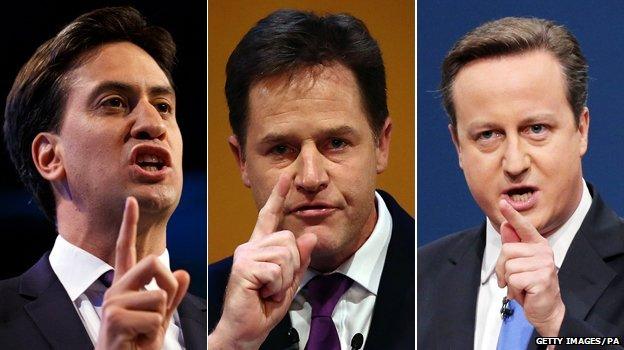

You can watch the speeches in full here:

Those were the soundbites. But, as BBC website politics editor Alex Hunt says, there was plenty in the speeches to show how the parties plan to approach the 2015 election:
"For Labour's Ed Miliband, the promise of an energy bills price freeze was the big announcement of the conference season and set up the dividing lines for the next election. Labour will be portraying itself as on the side of 'ordinary people' against big business and entrenched interests. Expect the party to try to make the 'cost of living' a key issue in 2015.
"Lib Dem leader Nick Clegg made an unambiguous pitch for voters to put the Lib Dems back in coalition government after the next election. There weren't many concrete policy pledges - the message was that as junior partners to Labour, they could stop the economy being messed up, and as junior partners to the Conservatives, they could force them to govern in a 'fairer' way.
"David Cameron's positive message was that a majority Conservative government's reforms to education, welfare and the public finances would make the UK a place where everyone can 'make it'. That looks set to be coupled at the election with the message that Ed Miliband is anti-business and offering '1970s-style socialism'." There is more analysis in James Landale's blog.
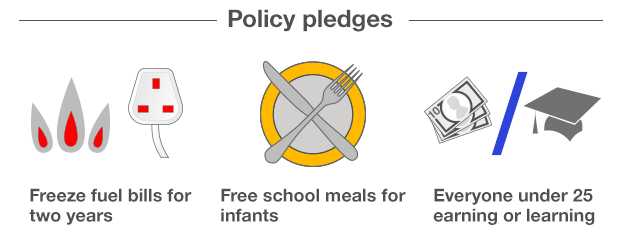
For Labour, Ed Miliband promised a two year freeze on the price of domestic fuel, if he were elected. He also wants to see the voting age reduced and he pledged that, under Labour, 200,000 new homes would be built a year by 2020 to create a fresh generation of new towns and garden cities.
Lib Dem leader Nick Clegg revealed plans to introduce free school meals for primary school children in reception, year one and year two from next September. Delegates also endorsed the leadership's plans for a so-called mansion tax on homes worth more than £2m and a further increase in the income tax threshold to exclude anyone on the minimum wage from paying tax.
For the Conservatives, David Cameron revealed plans for further welfare reforms after the next election - including a pledge to get everyone under 25 "earning or learning". Conference also heard plans for a new scheme to make long-term unemployed undertake work placements or compulsory training in return for benefits.
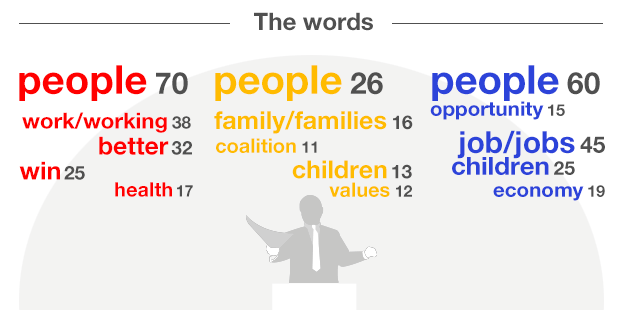
After "government" and "Britain", one of the most frequently-used words in all three of the leaders' speeches was "people". The graphic above highlights some of the other most-repeated words.
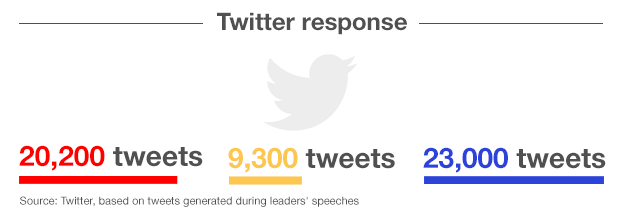
More than 70% of UK MPs are now on Twitter, up from 56% in 2012. During the conferences, there were more than 1.1 million mentions on Twitter, with the prime minister generating 175,000 mentions during the Tory conference, Ed Miliband got 67,000 during Labour's conference and there were 63,000 mentions of Nick Clegg during the Lib Dems' conference. The party leaders' speeches also generated thousands of mentions, as shown in the graphic above.

The party conference is one political event always attended by the leaders' wives and this year was no exception. Ed Miliband's wife Justine rallied the party faithful proclaiming she would be "more than a dress" in the battle for Number 10. Nick Clegg's wife, Miriam Gonzalez Durantez and David Cameron's wife, Samantha, chose not to speak but still appeared for the traditional end-of-speech photo call.
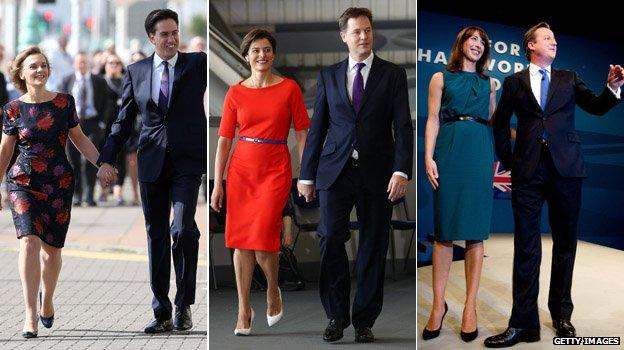
 Miliband: Britain can do better under Labour
Miliband: Britain can do better under Labour
 Clegg: Stronger economy, fairer society
Clegg: Stronger economy, fairer society
 Cameron: Land of opportunity
Cameron: Land of opportunity